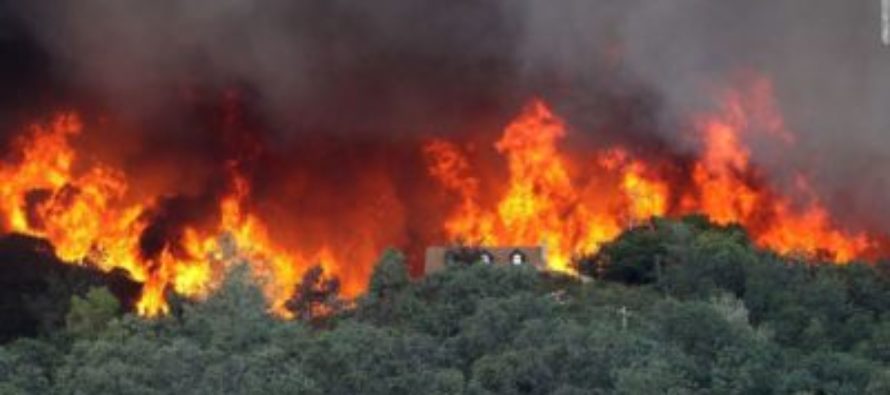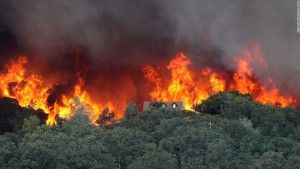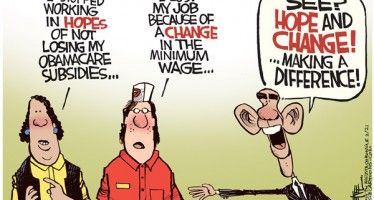Brown declares fire emergency

 Faced with a string of large, dangerous fires, Gov. Jerry Brown has declared a state of emergency.
Faced with a string of large, dangerous fires, Gov. Jerry Brown has declared a state of emergency.
“Firefighters in steep terrain and rugged conditions in California are fighting nearly two dozen wildfires that have torched more than 134,000 acres,” CNN reported, citing data obtained from state fire officials. “That’s nearly three times the state’s 5-year wildfire average of 48,153 acres for this time of year, according to statistics posted by the California Department of Forestry and Fire Protection, or Cal Fire.”
The largest blaze, the so-called Rocky Fire, tripled in size over the weekend, jumping a highway that had served as a containment line, according to reporting from KXTV Sacramento and the Associated Press.
Fire politics
By making the crisis official, Brown boosted the state’s ability to fight the fires in two ways. First, as the Sacramento Bee noted, he triggered the mobilization of the National Guard. Second, in a move likely to deepen the frustration of climate change activists, he “relaxed some regulations like environmental rules” and prohibitions on trespassing.
In a statement, Brown praised the state’s responders, but warned that the situation was critical. “California’s severe drought and extreme weather have turned much of the state into a tinderbox,” he said, according to the Sacramento Bee. “Our courageous firefighters are on the front lines, and we’ll do everything we can to help them.”
Fighting meddlers
California’s fire trouble has been compounded by residents interfering with operations — or, at times, necessitating new ones. A Redding resident, for instance, was recently arrested on suspicion of starting 14 small fires in the area.
But to date, the most sensational problem caused by meddlesome individuals has been drone related. In three separate instances, private drones floating overhead posed enough of a threat to firefighting airplanes that their missions were delayed. “After the unmanned devices were spotted flying above flames and smoke from the blazes this year — which altogether burned about 36,000 acres — fire crews were forced to ground water-dropping aircraft,” the Los Angeles Times noted. “Officials said the delays allowed the fires to spread, resulting in devastating property losses.”
As a result, San Bernardino County officials have now ponied up $25,000 apiece, one reward per incident, for details about who’s responsible. “We want to know who was flying drones, and we want them punished,” said Board of Supervisors chairman Jorge Ramos, according to the Verge. “Someone knows who they are, and there is $75,000 waiting for them.”
California lawmakers, Slate reported, “proposed a pair of bills that would make flying drones over fires a misdemeanor carrying up to $2,000 in fines and shield emergency personnel from liability for swatting them out of the way.” And in Congress, Rep. Paul Cook, R.-Ca., introduced legislation that would make similar interference a federal crime worth up to five years behind bars.
Related Articles
Covered CA blames cronyism on Obamacare scramble
In an embarrassing new black eye for Covered California, the state’s implementation of Obamacare, the health exchange, has admitted it
The impacts of raising San Francisco’s minimum wage to $15
On Nov. 4 San Francisco voters are being asked to approve Proposition J, a measure which increases the minimum wage
Insiders see Raiders’ exit from Oakland as inevitable
As CalWatchdog reported earlier this week, the San Diego Chargers are much closer to moving to Los Angeles, having gotten




